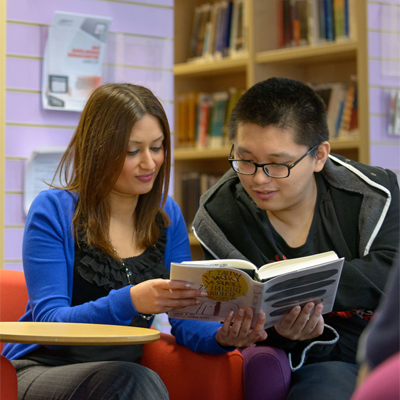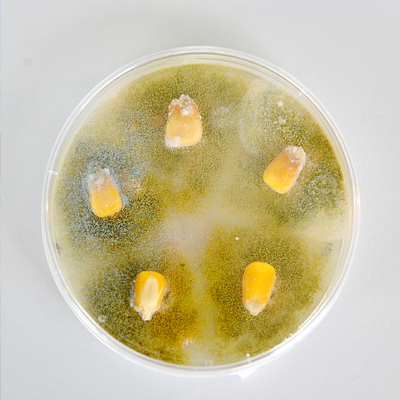In a webinar on 24 January, Professor Angel Medina Vaya, Professor in Applied Mycology and Director of Environment and Agrifood, gave a webinar on 'Making fungi travel through time to predict future food safety problems'.
During the session, Professor Vaya discussed:
- How the environmental fluctuations brought on by climate change are impacting the way some fungal pathogens grow.
- The impact this has on producing toxin metabolites known as mycotoxins which are an important food safety issue.
- The resulting impact this could have on food safety over the next 50 years.
If you attended the event and would like to conduct some further background reading, or if you couldn’t make it but you would like to know more about the topics that were discussed - here’s how you can use your free Alumni Library Online (ALO) service to stay informed.
Here are just a few examples of the sort of articles you can read via your ALO:
In ABI/Inform Global
Paterson, R. R. M., & Lima, N. (2017). Thermophilic Fungi to Dominate Aflatoxigenic/Mycotoxigenic Fungi on Food under Global Warming. International Journal of Environmental Research and Public Health, 14(2), 199.
Perrone, G., Ferrara, M., Medina, A., Pascale, M., & Magan, N. (2020). Toxigenic Fungi and Mycotoxins in a Climate Change Scenario: Ecology, Genomics, Distribution, Prediction and Prevention of the Risk. Microorganisms, 8(10), 1496.
Adhikari, M., Isaac, E. L., Paterson, R. R., & Maslin, M. A. (2020). A Review of Potential Impacts of Climate Change on Coffee Cultivation and Mycotoxigenic Fungi. Microorganisms, 8(10), 1625.
Zingales, V., Taroncher, M., Martino, P. A., María-José Ruiz, & Caloni, F. (2022). Climate Change and Effects on Molds and Mycotoxins. Toxins, 14(7), 445.
Queenta, N. N., Babalola, O. O., Ekwomadu, T. I., Nleya, N., & Mwanza, M. (2022). Six Main Contributing Factors to High Levels of Mycotoxin Contamination in African Foods. Toxins, 14(5), 318.
Sahar, N., El Khoury André, Ioannis, S., Ali, C., Louka, N., & Ali, A. (2022). Detoxification approaches of mycotoxins: by microorganisms, biofilms and enzymes. International Journal of Food Contamination, 9(1).
In IWA Journals
Ntombie Thandazile Mhlongo, Memory Tekere, Timothy Sibanda. (2019). Prevalence and public health implications of mycotoxigenic fungi in treated drinking water systems. J Water Health, 17(4), 517–531.
Duygu Göksay Kadaifciler, Rasime Demirel. (2018). Fungal contaminants in man-made water systems connected to municipal water. J Water Health, 16(2), 244–252.
Mosimanegape Jongman, Lise Korsten. (2016). Microbial quality and suitability of roof-harvested rainwater in rural villages for crop irrigation and domestic use. J Water Health, 14(6), 961–971.
Fuad Ameen, Alhanouf Albejad, Rukaia Gashgari, S. Murialdo, A. Al-Sabri. (2018). Diversity of fungi in bottled water in Jeddah, Saudi Arabia. Water Supply, 18(5), 1664–1673.
In Sage Journals
Kutyauripo, I., Masamha, B., & Maringe, P. (2021). Exploring climate change adaptation strategies in maize (Zea mays) postharvest management practices among smallholder farmers. Outlook on Agriculture, 50(2), 148–157.
Hassan YI, Zhou T, Bullerman LB. (2016). Sourdough lactic acid bacteria as antifungal and mycotoxin-controlling agents. Food Science and Technology International, 22(1), 79-90.
Zeigler, R. S. (2019). Plant sciences, public policies and food security. Outlook on Agriculture, 48(3), 220–228.
Zani C, Restivo FM, Carcelli M, et al. (2015). A Biotechnological Approach for the Development of New Antifungal Compounds to Protect the Environment and the Human Health. Journal of Public Health Research, 4(3).
Pires SM, Thomsen ST, Nauta M, Poulsen M, Jakobsen LS. (2020). Food Safety Implications of Transitions Toward Sustainable Healthy Diets. Food and Nutrition Bulletin, 41(2_suppl), 104S-124S.
Levasseur-Garcia C, Kleiber D. (2015). A Method for the Allotment of Maize Contaminated by Toxins. Journal of Near Infrared Spectroscopy, 23(4), 255-265.
Open Access articles in ScienceDirect from Elsevier
Although Elsevier does not generally permit alumni access to ScienceDirect material, don’t forget there are many articles available via open access (the author has paid to allow their article to be publicly available without a subscription).
Here are some examples of open-access articles in this subject area with direct links to the full text:
Rhea Sanjiv Chhaya, John O'Brien, Enda Cummins. (2022). Feed to fork risk assessment of mycotoxins under climate change influences - recent developments. Trends in Food Science & Technology, 126, 126-141
https://doi.org/10.1016/j.tifs.2021.07.040
Ksenija Nesic, Dragan Milicevic, Vladimir Nesic, Snezana Ivanovic. (2015). Mycotoxins as One of the Foodborne Risks Most Susceptible to Climatic Change. Procedia Food Science, 5, 207-210.
https://doi.org/10.1016/j.profoo.2015.09.058
Vishwambar Navale, Koteswara Rao Vamkudoth, Shanthipriya Ajmera, Vaibhavi Dhuri. (2021). Aspergillus derived mycotoxins in food and the environment: Prevalence, detection, and toxicity. Toxicology Reports, 8, 1008-1030.
https://doi.org/10.1016/j.toxrep.2021.04.013
Zsófia Tischner, Anna Páldy, Sándor Kocsubé, László Kredics, Csaba Dobolyi, Rózsa Sebők, Balázs Kriszt, Bence Szabó, Donát Magyar. (2022). Survival and growth of microscopic fungi derived from tropical regions under future heat waves in the Pannonian Biogeographical Region. Fungal Biology, 126(8), 511-520.
https://doi.org/10.1016/j.funbio.2022.04.005
Raghda A. El-Sayed, Ali B. Jebur, Wenyi Kang, Fatma M. El-Demerdash. (2022). An overview on the major mycotoxins in food products: characteristics, toxicity, and analysis. Journal of Future Foods, 2(2), 91-102.
https://doi.org/10.1016/j.jfutfo.2022.03.002
Want to hear more from the keynote speaker?
If you are interested in more information from Professor Angel Medina Vaya, please see his work in CERES, Cranfield University’s repository.
Not sure how to find us? Follow these simple steps to the Alumni Library Online service:
- Go to your alumni portal.
- Log in with your details.
- Scroll down the page and click on Alumni Library Online.
- Click on Databases to find the databases listed above, and much more!
Forgotten your portal login?
Please email the Alumni team.
Any other questions?
Contact your ALO team.



